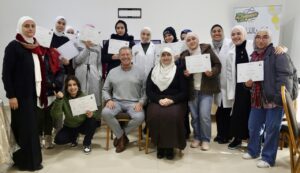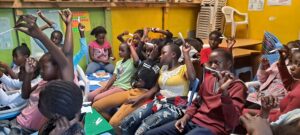By Alex Dutton, Phoenix Space Head of Education.
For our first post, we’re going to start big, very big. Have you ever taken off in a plane, looked out of the window and seen all the people, cars, houses, streets shrink into specks and felt yourself temporarily away from the world? Imagine not just these objects, but entire mountains, cities, islands, seas all passing beneath you in a few seconds. How might you feel? Would you be so bothered about all the things down there that hitherto seemed so important?
Many astronauts have reported a significant cognitive shift on seeing the earth from orbit where, from their raised and detached perspective, they obtain a new, almost mystical, worldview. They see the earth as it is, the sole site of habitation wrapped in an atmosphere as thin as the skin of an apple is to the apple, an atmosphere that is all that is between us and inhospitable void of space. This ‘overview’ effect has been described and shown in many ways, some are below:
“The thing that really surprised me was that it [Earth] projected an air of fragility. And why, I don’t know. I don’t know to this day. I had a feeling it’s tiny, it’s shiny, it’s beautiful, it’s home, and it’s fragile.” — Michael Collins, Apollo 11
“Look again at that dot. That’s here. That’s home. That’s us. On it everyone you love, everyone you know, everyone you ever heard of, every human being who ever was, lived out their lives. The aggregate of our joy and suffering, thousands of confident religions, ideologies, and economic doctrines, every hunter and forager, every hero and coward, every creator and destroyer of civilisation, every king and peasant, every young couple in love, every mother and father, hopeful child, inventor and explorer, every teacher of morals, every corrupt politician, every “superstar,” every “supreme leader,” every saint and sinner in the history of our species lived there — on a mote of dust suspended in a sunbeam.” — Carl Sagan
How can we bring this overview effect back to earth? How can we share and nourish this perspective to change the small-minded ways in which most of us behave on an everyday basis? I’ll share some of my own attempts to bring this to others. I often projected livestreams from space onto the walls/ceiling of my flat and invited friends to watch with me without commentary or explanation. It’s wonderful to see grown adults overwhelmed with childlike wonder and lose track of time completely. I’ll never forget the faces of our students in Istanbul during our pilot in August 2019 when they fully comprehended that what they were seeing on the large projection in their classroom was the up-to-the-minute live footage of the same earth that they were living on, turning in front of them.
An older, lower-tech way to get a similar feeling is to go out stargazing. There’s no need for a telescope or binoculars: just bring a good pair of eyes to a dark, cloudless sky. Lying on your back and looking towards the heavens and reminding yourself that you are looking outwards not upwards gives a hint of what it must feel like to be in orbit. You come to realise that out into that great void there is no other home out there for us for now, that only by the weak force of gravity are you and the air you breath stuck on to the thinnest layer of the outside of our rocky spaceship, and that out in every direction is a universe far emptier and mysterious than we can comprehend. I was lucky enough to be able to spend some time in Taos, New Mexico last year which affords fantastic low-humidity, high-altitude conditions for stargazing. My favourite memory from that time was spending hours beneath the stars in the crisp air, desperately trying to keep my phone battery warm and alive as I was using the phone to control the camera to create this composite image below.
When Carl Sagan asked for NASA’s Voyager 1 to take the last picture of Earth before the spaceship left our solar system, he knew that it would be of little scientific value. But he correctly predicted an enormous significance of the photograph in giving proper perspective to our place in this universe.
Indeed, from space, national boundaries vanish, the misunderstanding and conflicts that divide people become irrelevant. Frank White who first coined ‘the overview effect’ when he was flying in an airplane, wrote ‘Anyone living in a space settlement… will always have an overview. They will see things that we know, but that we don’t experience, which is that the Earth is one system,” we’re all part of that system, and there is a certain unity and coherence to it all.”
When we started Phoenix Space, we wanted to give our students a unique gift, something that, even if temporarily, helps them forget the cruelties of war, their loss and grief, the constant struggle. We want our students to gain the motivation and confidence to transcend their daily realities and discover the strength to be adventurous, creative and to take control of their lives. Understandably, we can’t send our students up into space right now, but through our work we hope to stimulate their own personal overview effect: being taught by teachers across the globe, looking at photographs taken from the top of the atmosphere on a high-altitude balloon, or a small satellite they helped to make and understand the physics of, being part of a program with students in multiple countries and, perhaps above all, learning about nature and science that allows them to stand on the shoulders of giants and see a little further.



